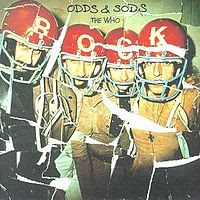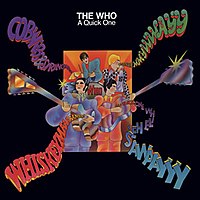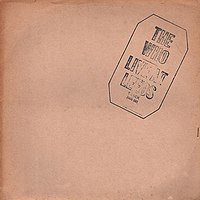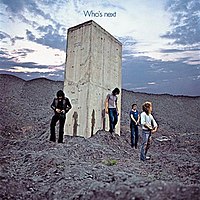No longer updated
See The Who Album by Album
The Who were a rock band who were at their height from 1965 to around 1973. They developed in Acton, West London from Roger Daltrey's band the Detours. As well as Daltrey, the band included guitarist Pete Townshend, bassist John Entwistle, and drummer Keith Moon. They are mostly associated with a dynamic live act, which involved smashing up their equipment, the "rock opera" double album Tommy, and a string of popular singles in the Sixties.
Their best known singles are "My Generation" (1965), "Substitute" (1966), "I Can See for Miles" (1967), "Pinball Wizard" (1969), and "Won't Get Fooled Again" (1971). Along with the critically acclaimed rock opera albums Tommy (1969), and Quadrophenia (1973), they made what has been acclaimed as the best ever live rock album, the original vinyl version of Live at Leeds (1970). They delivered energetic live performances with Townsend leaping in the air, shaking his guitar, and playing it with wild "windmill" strokes, Moon thrashing his large drum kit, and Daltrey spinning his mic around his head. After a performance at the Railway Hotel in Wealdstone in June 1964 when Townshend smashed his guitar in anger and frustration, the band would often finish their act by smashing their instruments. During the height of their Sixties career they were regarded as the third most important British rock act after the Beatles and the Rolling Stones.
Though accomplished and acclaimed, and containing notable elements, such as the high energy playing and live performances, socially aware and well constructed songs, a simmering attitude, ambitious albums that challenged and stretched rock music, an adventurous bass player, and one of rock's wildest drummers, the band - even at their height - were not regarded as the best British rock act. Their reputation has not been helped because their output has been uneven, and songs on the albums could often be weak - going through the rock motions while not actually setting anything alight. While elements of the band were great, the sum total didn't always work. While at times the reverse was true, and the whole was greater than the sum of their parts. Daltrey has a strong, clean voice - but for most of the band's career it tends to sound more like a stage musical voice than that of a rock singer - it was only during a brief period in the early Seventies that he developed the confidence to fully engage his voice and hold the stage during live performances. His stage presence, while looking good, and being full of movement, often lacked aggression and confidence, and couldn't quite match the brooding performances of Robert Plant, Liam Gallagher, Jim Morrison, Mick Jagger, Ian Brown, Van Morrison, etc. Keith Moon was wild and exciting, but rather limited, so the rhythms are largely driven by Entwistle and Moon's role becomes one of percussion accompaniment rather than the driving heart of the group. And his accompaniment becomes rather mundane and expected after a while - only occasionally does he offer something of interest. However, his high speed rolls and cymbal clashing can be very entertaining (albeit in small doses). Townshend has great stage presence - an angry, frustrated young man exploding with energy. His leaps in the air, and his windmill guitar playing are vivid rock images. Yet his beard and clothes choice gave him a rather odd, geeky appearance. The "concept" approach to song writing, and the desire to appear serious and interesting, gave the band a rather earnest ambiance which was at odds with the more natural and genuinely interesting attitude of other bands of their Sixties period such as Cream, The Kinks, The Yardbirds, The Bluesbreakers, The Animals, Them, Small Faces, Rolling Stones, etc. And by the Seventies they had fallen behind the new acts such as Deep Purple, David Bowie, Led Zeppelin, Hawkwind, Yes, Genesis, Black Sabbath, etc.
The band's first released recording was "Zoot Suit" (under the name The High Numbers). A competent copy of the 1963 recording of "Misery" by the Detroit RnB group The Dynamics. There is a film of them playing as The High Numbers in the Railway Hotel in 1964. With their first singles as The Who they laid down a series of four top 10 singles that still stand up now, "I Can't Explain" (Jan 1965), "Anyway, Anyhow, Anywhere" (May 1965), "My Generation" (Nov 1965), and "Substitute", (April 1966). They continued with singles that often reached into the top 50, right into the early Eighties when "You Better You Bet" reached number 9 in 1981. The best of their singles after the first four are: "I Can See for Miles" (1967) - that Townshend felt was a guaranteed hit and was bitterly disappointed that it only reached number 9 - they never played the song live with the original members - apparently due to Moon feeling he couldn't reproduce the drumming; "Pinball Wizard" (1969) - the lead single from ''Tommy'', and the track that for many represents the best of that album; and "Won't Get Fooled Again" - a tight 3 1/2 minute edit from the epic 8 1/2 minute version on the Who's Next album.
The albums that gain the most attention are the four studio and one live they made between 1967 and 1973: The Who Sell Out (1967), Tommy (1969), Live at Leeds (1970), Who's Next (1971), and Quadrophenia (1973). Of those, Tommy is the album most associated with the band, and the one on which their main album reputation rests. The Who Sell Out is perhaps the weakest of the bunch, but is frequently mentioned by music writers because the album had a loose concept (it is presented as a commercial radio station along with jingles and adverts). Apart from "I Can See for Miles", which was released as a single, I struggled to like the album for many years, and while not seeing it quite as the band;s best album, I am coming round to appreciating some of the songs on it. The original vinyl version of The Who Live at Leeds is, for me, the band's best album, and serves as a great introduction to The Who. It has six songs only - the blistering renditions of the rock standards: "Shakin' All Over", "Summertime Blues", and "Young Man Blues", and three of the band's more popular songs: "Substitute", "My Generation", and "Magic Bus". "My Generation" and "Magic Bus" are extended version, with "My Generation" including bits from Tommy. I also like and will recommend Meaty Beaty Big And Bouncy, a 1971 compilation.
The Who are essentially Townshend's band. Though it was originally Daltrey's band, his aggressive leadership, backed up by using his fists, resulted in the other three sacking him early on, and he had to beg to be let back in, which crushed his confidence and bravado until after the success of Tommy, by which time he felt he had earned his place in the band. Almost all the song-writing, and certainly the direction the band went in, and the albums they made, were Townsend, and on some albums Townsend even does a lot of the lead vocals. His interests and ego are displayed on the bulk of the songs - for better or worse.
Good introductions to the band are the 1971 compilation, Meaty Beaty Big and Bouncy, which contains most of their Sixties singles on which the bulk of their reputation rests, the 1970 live album, Live at Leeds, which represents them at their live best, and the 1969 album Tommy, their most famous album which in its ambition (or pretension), tight (or narrow) musical focus, and generous (or unnecessary) length exemplifies their approach to making albums.
Albums
| My Generation (1965) Note: Original has 12 tracks, finishing with "The Ox" |
Other albums released in 1965 (1965 was a good year, with Highway 61 Revisited and Rubber Soul, among others, so I'm only selecting albums with some relevance to The Who's R&B style):
- The Angry Young Them Them - debut
- For Your Love Yardbirds - American release
- Here Are The Sonics The Sonics - debut
- Out Of Our Heads The Rolling Stones
- The Kink Kontroversy The Kinks
- Begin Here The Zombies - debut
- The Pretty Things The Pretty Things - debut
- The Hollies The Hollies
- The Magnificent Moodies The Moody Blues - debut
- Animal Tracks The Animals
- Take A Heart The Sorrows - debut
AllMusic: 10
Score: 6
| A Quick One (1966) |
Best songs are the cover of "Heat Wave", "So Sad About Us", and "
| The Who Sell Out (1967) |
I've been struggling with this album. I had it back in the early Seventies, and didn't think much of it. I was put off by what I felt to be the superficial and tacky gimmicks of the adverts and radio jingles, and was not charmed by any of the tracks other than the rather basic but wonderfully thunderous "I Can See For Miles". On reviewing the album when I first wrote this blog back in 2013, I was scathingly dismissive, perhaps carrying some latent bias with me. While I am not finding the album a masterpiece, and can still feel the weaknesses I felt earlier - the limited drumming, the lack of adventure and movement in the music, etc, I am seeing far more in it that I did previously. The songs do yield up something to those prepared to listen with an open mind. I have my doubts about the value of the concept behind the album, and would much rather all the garbage jingles were removed, but accept that it is what it is, and it's a reflection of it's time when everyone seemed to want to do some sort of concept album.
Wikipedia
AllMusic: 10
Score: 5
| Tommy (1969) |
There are snatches of songs which contain some interesting and vibrant music, but the only song that stands up by itself is "Pinball Wizard". The Ken Russell film based on the album brought some life and colour to the music, and Tina Turner's rendition of "The Acid Queen" is wonderfully over the top, if a little thin and trashy. The album is over-long, overblown, and often rather tedious and uninspired, but for both ambition and status it is a must listen album.
Wikipedia
AllMusic: 9
Score: 5 1/2
| Live at Leeds (1970) |
Wikipedia
AllMusic: 10
Score: 8
| Who's Next (Aug 1971) |
Wikipedia
AllMusic: 10
Score: 6 1/2
 |
| Meaty Beaty Big and Bouncy (Oct 1971) |
Wikipedia
AllMusic: 10
Score: 6 1/2
| Quadrophenia (1973) |
Wikipedia
AllMusic: 10
Score: 3 1/2
 |
| Odds & Sods (1974) |
Wikipedia
AllMusic: 7
Score: 3
 |
| Tommy Soundtrack (March 1975) |
Wikipedia
AllMusic: 4
Score: 6
| The Who by Numbers (Oct 1975) |
Wikipedia
AllMusic: 8
Score: 3
| Who Are You (1978) |
Wikipedia
AllMusic: 7
Score: 2
Retrospective live albums (with Keith Moon)
 |
| Live At The Fillmore East 1968 (2018) |
Wikipedia
AllMusic: 9
Score: 6
 |
| Live At Hull 1970 (2012) |
Wikipedia
AllMusic: 5
Score: 5
 |
| Live at the Isle of Wight Festival 1970 (1996) |
Wikipedia
AllMusic: 9
Score: 5
 |
| BBC Sessions (2000) |
Wikipedia
AllMusic: 9
Score: 3
Post-Keith Moon
 |
| Face Dances (1981) |
Wikipedia
Allmusic: 7
Score: 2 1/2
Score: 2
 |
| Who's Last (1984) |
Wikipedia
AllMusic: 4
Score: 3
 |
| Endless Wire (2006) |
The new Who split up in 1983, reforming occasionally for a concert. Then Entwistle died in 2006. So this is The Who mark III with just Daltrey and Townsend and a variety of backing musicians. The opening song is better than I expected from the previous post-Moon albums, with a return to something like the early Seventies sound, including pretty much the same synthesiser refrain used a couple of times on Who's Next. But as usual Townsend's lyrics are too wordy, like something from a Broadway musical, and Daltrey's delivery is forced into being stilted and empty in order to carry the sentences. When given the chance Daltrey can really belt it out, but too often he's expected to be stage actor and Broadway musical singer. That's always been the case, though it's perhaps more obvious here. On "In The Ether" he strains his voice to give a passable imitation of Tom Waits, giving some indication of the potential lost.
Wikipedia
AllMusic: 7
Score: 3 1/2
Score: 3 1/2
 |
| Who (2019) |
Wikipedia
AllMusic: 8
Score: 4 1/2
Discography
- My Generation (1965) [6]
- A Quick One (1966) [3]
- The Who Sell Out (1967) [5]
- Tommy (1969) [5 1/2]
- Live at Leeds (1970) [8]
- Who's Next (1971) [6 1/2]
- Meaty Beaty Big and Bouncy (Oct 1971) [6 1/2]
- Quadrophenia (1973) [3 1/2]
- Odds & Sods (1974) [3]
- Tommy Soundtrack (March 1975) [6]
- The Who by Numbers (1975) [3]
- Who Are You (1978) [2]
Retrospective live albums with Keith Moon
- Live At The Fillmore East 1968 (2018) [6]
- Live At Hull 1970 (2012) [5]
- Live at the Isle of Wight Festival 1970 (1996) [5]
- BBC Sessions (2000) [3]
Post-Keith Moon
- Face Dances (1981) [2]
- It's Hard (1982) [2]
- Endless Wire (2006) [3 1/2]
- Who (2019) [4 1/2]
Albums ranked
* RollingStone
* Louder
* UCRock
* NME
* BEA
* RYM
* Ranker
* Stereogum
* Top Ten
* ClassicRock
* RoR
* Chart
5 points for 1st, 3 for 2nd, 2 for 3rd, 1 each for 4th & 5th. Most lists don't include live and/or compilation albums (though all include the post Moon albums), so the position of Live At Leeds and the Meaty compilation are lower than they otherwise would be.
Who's Next (1971) 56
Quadrophenia (1973) 26
Tommy (1969) 31
Live at Leeds (1970) 19
My Generation (1965) 13
Meaty Beaty Big and Bouncy (1971) 10
The Who Sell Out (1967) 9
Who Are You (1978) 1
My list
Live at Leeds (1970)
Who's Next (1971)
Meaty Beaty Big and Bouncy (1971)
My Generation (1965)
Live At The Fillmore East 1968 (2018)
Tommy Soundtrack (March 1975)
Tommy (1969)
The Who Sell Out (1967)
Top tracks
"My Generation"
"Substitute"
"I Can See for Miles"
"Pinball Wizard"
"Summertime Blues" (Live at Leeds)
"Young Man Blues" (Live at Leeds)
"Magic Bus" (unedited version - Greatest Hits Live)
"Won't Get Fooled Again"
"Who Are You"
Links
* Great footage of the band playing at The Railway Hotel as The High Numbers. * The Who.com (Official site)
* Rolling Stone profile
* Wikipedia
* AllMusic
* The-who.net (Fan site)
* Thewho.net (Fan site)
* Moon passes out on stage and is replaced by a fan from the audience
The Who 80 minute CD
"Zoot Suit"
"I Can't Explain"
"Anyway, Anyhow, Anywhere"
"Out In The Street"
"My Generation"
"The Kids Are Alright"
"The Ox"
"Substitute"
"Heat Wave"
"I Can See for Miles"
"Summertime Blues"
"Young Man Blues"
"Magic Bus"
"Pinball Wizard"
"I'm Free" (version from the film)
"Won't Get Fooled Again"
"Baba O'Riley"
"5.15"
"Squeeze Box"
"Who Are You"
Summary
Voice/Musicianship
Daltrey has a strong clear voice that carries Townshend's lyrics very effectively. The lyrical themes rarely ask anything subtle, clever or emotional from Daltrey so he handles it all with ease. In the early Seventies his voice style and power could at times be compared to Robert Plant, and the yell near the end of Won't Get Fooled Again is awesome - one of the best vocal moments in rock. However, the voice is limited: clarity and strength can only offer so much. Moon is a very popular drummer, and is an essential part of the image of The Who - his wild drum rolls and cymbal clashing, combined with his mad antics and wild lifestyle, present a Muppets image of a rock drummer during rock's teenage years. Sadly, his drumming, flashy and fun, and exciting though it could be, was fairly limited - he couldn't hold the band together, nor drive them forward, and his limited range became very boring when faced with an album load of it. But the nature of his appeal means that there will always be a debate about how "good" he was. On some tracks, especially the singles, I find him irresistible exciting and "rocky". Sigh. Townsend's on stage windmill playing and guitar smashing makes him an iconic guitar figure. The band were essentially a power trio, especially live, relying on electric guitar, bass and drums. While they were not the first, they were playing as a power trio before Cream were formed. During recording, Townsend would sometimes play two different guitar parts, or there would be a piano part added, so they were not consistently a power trio, but they did approach most songs in a direct almost brutal manner typical of a power trio. Townsend's playing, especially early on, could be fairly limited to strummed chords, simple, albeit pleasant, arpegios, and then strategic notes or a riff. But now and again he could explode with musical aggression and power, and sometimes sustain a reasonably complex musical sequence. Though his main style was the simple attack, for which he was famous and very effective, especially when part of the whole band going for it. Entwistle is the band's genuine musical talent. He held the band together, drove them forward, and occasionally used the bass as lead. His work in covering for Moon, dueling with Townsend, playing bass lead, and holding the whole band together is sometimes mentioned, but too often what he did is overlooked for the flash and strength of the other three. All in all, the band amounted to more than the sum of their parts, and at their best there is a compelling musical power about them that is simply awesome.
11/15
Image
Part of their image is the cool, angry mods wrecking their instruments in frustration. Another is their wild and energetic live act. Moon's manic behaviour and drumming. These are positive rock images, much admired by the Mod revivalists and Punks of the Seventies. Unfortunately they are are also associated with Townshend's pondering earnestness. And they are always seen as lying behind The Beatles, Stones, And Led Zeppelin in importance - so feel a little second rate. So, big band, but not - quite - awesome.
4/5
Lyrics
Effective lyrics. Sometimes very good. Often merely workmanlike and over wordy and earnest. Trying too hard to be meaningful, and forgetting the power of a direct lyric that speaks for the listener.
6/10
Music
At times the music was brilliant - but that has to be balanced by the dreary stuff that forms the bulk of their album work.
6/10
Impact/Influence
Yes. They had a big impact, though their importance can be over-stated as they didn't break new ground.
7/10
Popularity
Fairly popular.
4/5
Star quality
OK
3/5
Emotional appeal
Not really their thing. But the music can get you worked up at times.
3/5
Authenticity
They believed in themselves, and weren't just doing it for the money. That they sometimes outreached for things beyond their grasp, or worked beyond their talent is not, for me, a negative in this category. Yes, overall, an artist tends to be more successful being aware of and playing to their strengths, but there is also something admirable in musicians pushing the boundaries of their own abilities.
16/25
Legacy
They will be remembered.
6/10
Total: 66/100
Voice/Musicianship (15), Image (5), Lyrics (10), Music (10), Impact/Influence (10), Popularity (5), Star quality (5), Emotional appeal (5), Authenticity (25), and Legacy (10).
 |
|
Best Of The Best
|
64 April 2019
78 Jan 2020













No comments:
Post a Comment
Comments welcome